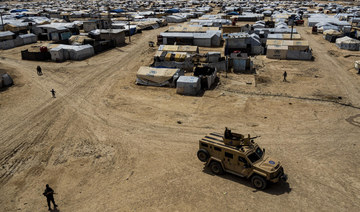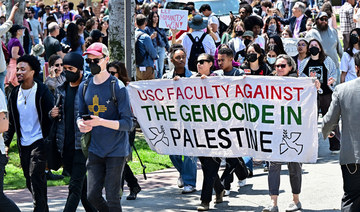JOHANNESBURG: South Africa’s last white president FW de Klerk died on Thursday aged 85, having helped steer the nation to democracy while never fully owning up to the horrors of the apartheid past.
He died at home early Thursday after a battle with cancer, his foundation said in a statement.
De Klerk freed Nelson Mandela from prison, unbanned political parties, and later shared a Nobel Peace Prize with the anti-apartheid icon.
Yet he never found a place in the democratic South Africa, and became seen as an apologist for the torture and killings committed by the segregationist regime.
His testimony had been demanded in several current cases seeking answers over past atrocities.
But in a surprise move, he tendered an apology — in a posthumous video message.
“I without qualification apologize for the pain and hurt and the indignity and the damage that apartheid has done to black, brown and Indians in South Africa,” he said in the video released by his foundation.
The Nelson Mandela Foundation captured the sentiments of many, saying: “De Klerk’s legacy is a big one. It is also an uneven one, something South Africans are called to reckon with in this moment.”
President Cyril Ramaphosa noted that De Klerk “played a vital role in our transition to democracy.”
British Prime Minister Boris Johnson, one of the few foreign leaders to quickly offer condolences, hailed De Klerk’s “steely courage and realism in doing what was manifestly right and leaving South Africa a better country.”
The office of one of the harshest critics of apartheid, Archbishop Emeritus Desmond Tutu, said “the former president occupied a historic but difficult space in South Africa.”
De Klerk’s appearance before the Truth and Reconciliation Commission, which uncovered the atrocities of the white-minority regime, met with Tutu’s chagrin.
At the time, Tutu expressed “disappointment that the former president had not made a more wholesome apology on behalf of the National Party to the nation for the evils of apartheid,” his foundation said.
Julius Malema, the 40-year-old leader of the leftist Economic Freedom Fighters, didn’t hide his feelings. “Thank you God,” he tweeted, followed by five dancing emojis, echoing the sentiments of many younger South Africans on social media.
But opposition Democratic Alliance leader John Steenhuisen said “rather than dividing our country, may his passing and his memory make us even more determined to work toward a united South Africa.”
He said De Klerk’s contribution to South Africa’s transition to democracy “cannot be overstated” while his predecessor Tony Leon likened De Klerk to Mikhail Gorbachev.
Had he “not relinquished power in 1994, likely SA would be Syria or Venezuela today,” Leon tweeted.
De Klerk sparked fury last year when he denied apartheid was a crime against humanity, despite the UN declaring it such.
“The idea that apartheid was a crime against humanity was and remains an agitprop project initiated by the Soviets... to stigmatize white South Africans,” he said.
Ramaphosa reacted angrily, telling lawmakers that the comments were “treasonous.”
De Klerk later apologized and retracted the controversial statement.
Born in Johannesburg into a family of Afrikaners, a white ethnic group descended mainly from Dutch colonizers, his father was an apartheid senator who served briefly as interim president.
After studying law, De Klerk was elected to parliament as a member of the National Party that instituted apartheid.
De Klerk held several ministerial positions before he became president in 1989, a position he held until he handed over the reins to Mandela after the first democratic elections in 1994.
De Klerk later said freeing Mandela had “prevented a catastrophe.”
His funeral dates are yet to be announced.
He is survived by his wife Elita, children Jan and Susan, and grandchildren.
S.Africa’s last apartheid president FW de Klerk dies
https://arab.news/burwe
S.Africa’s last apartheid president FW de Klerk dies
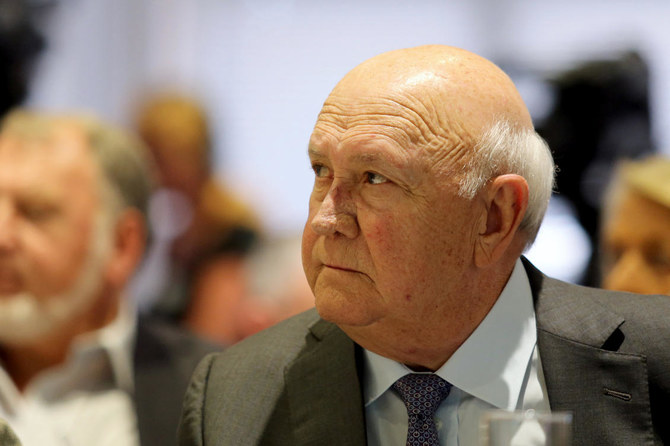
- He died at home early Thursday after a battle with cancer, his foundation said in a statement
- De Klerk never found a place in the democratic South Africa, and became seen as an apologist for the torture and killings committed by the segregationist regime
Two suspected Kashmir rebels killed in clash with Indian forces
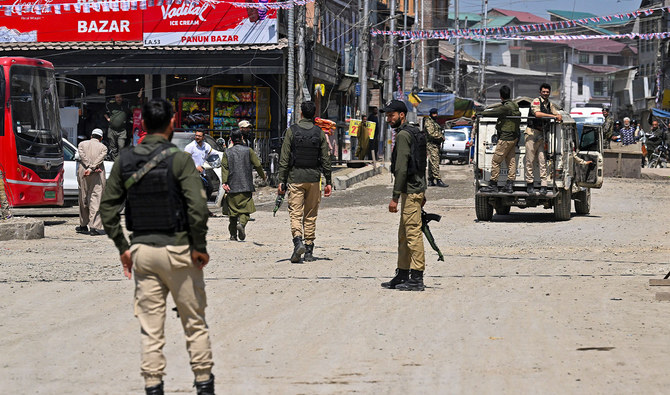
- Firefight between suspected rebels, soldiers takes place amid national elections in disputed territory
- Divided between nuclear-armed India and Pakistan since 1947, Kashir is claimed by both countries in full
SRINAGAR, India: Two suspected rebels were killed in Indian-administered Kashmir during a firefight with soldiers, police said Tuesday, at a time when campaigning for national elections is underway in the disputed territory.
Scores of soldiers besieged a residential area in southern Kulgam district, some 70 kilometers (43 miles) from Kashmir’s biggest city Srinagar, on Monday after armed militants were suspected to be present inside a house.
Two bodies of the suspected rebels “were recovered so far” from the site, police said in a statement posted Tuesday on social media platform X.
Images from the area showed smoke billowing from a house after it caught fire during the skirmish.
Kashmir has been divided between India and Pakistan since their independence in 1947, with both claiming the Himalayan territory in full.
Rebel groups opposed to Indian rule have for decades waged an insurgency in Indian-controlled Kashmir, demanding either independence or a merger with Pakistan.
The conflict has left tens of thousands of civilians, soldiers and militants dead.
Violence and anti-India protests have drastically reduced since 2019, when Prime Minister Narendra Modi’s government canceled the Muslim majority region’s limited autonomy.
But clashes between security forces and rebel groups have increased since voting began last month in India’s six-week election.
Three suspected rebels were killed and a police officer and three soldiers wounded in three separate clashes across the territory in April.
Militants ambushed a military convoy in Kashmir’s south on Sunday, killing one Indian air force corporal and wounding four other troops.
Trinidad, Tobago urged to repatriate women, children from Iraq
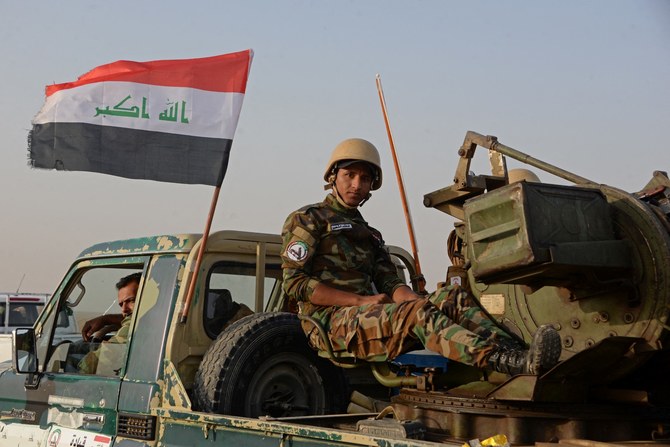
- A number of its citizens are being held in detention for alleged involvement with Daesh
- Human Rights Watch: Innocent children have been denied proper access to education, healthcare, nutritious food
London: Human Rights Watch has urged the government of Trinidad and Tobago to repatriate a number of its citizens from Iraq being held in detention for alleged involvement with Daesh.
HRW said four Trinidadian women have been held by authorities in Iraq along with seven children, aged 7-15 years, for almost seven years.
It said it had been in contact with one mother, currently in Rusafa prison, who on May 2 told them in a voice recording that her two sons, aged 13 and 15 — one of whom suffers from asthma, anaemia and malnutrition — had been taken away from her.
“They took my son from me, they told me he was too big to be staying in a cell with us. They put him in a cell with about 10 boys,” she said.
“We have no education for our children. Nothing. We are going on our seventh year in prison and our children are growing up here.”
Another mother told HRW on May 4: “We are here just waiting, and time is wasting. Our children remain uneducated without any knowledge.”
Rusafa is believed to hold around 100 youths as well as their mothers, with many of the adults foreign nationals charged with or convicted of terrorism-related crimes.
Three of the four Trinidadian women are being held there, serving sentences of 20 years or more.
The fourth is being held with her two children in the city of Erbil in Iraqi Kurdistan, where she has completed her sentence but cannot leave without government help.
Jo Becker, children’s rights advocacy director at HRW, said: “Trinidad and Tobago has publicly promised that it would bring home its nationals from Iraq and Syria, but not a single Trinidadian has returned home in more than five years.
“These children, who are not responsible for any crime, should be in school in Trinidad and Tobago, not languishing in an Iraqi prison.”
The four women from Trinidad and Tobago told HRW that they are prepared to have their children repatriated even if it means they must stay in Iraq, but have had no word on a decision by the government despite communicating with the repatriation committee established by Trinidadian Prime Minister Keith Rowley in March 2023.
HRW said the Trinidadian authorities should look to repatriate the children as they have been denied proper access to education, healthcare and nutritious food.
In a statement, it said: “The Iraqi and Trinidadian authorities should weigh the children’s best interests and right to family unity and consider repatriating both the children and their mothers, so their children could regularly visit their mothers as they serve out their sentences in Trinidad and Tobago.”
Becker added: “Trinidad and Tobago’s prime minister has pledged to bring the Trinidadians detained in Iraq and Syria home. He shouldn’t wait any longer.”
Dutch police end a pro-Palestinian demonstration at Amsterdam university
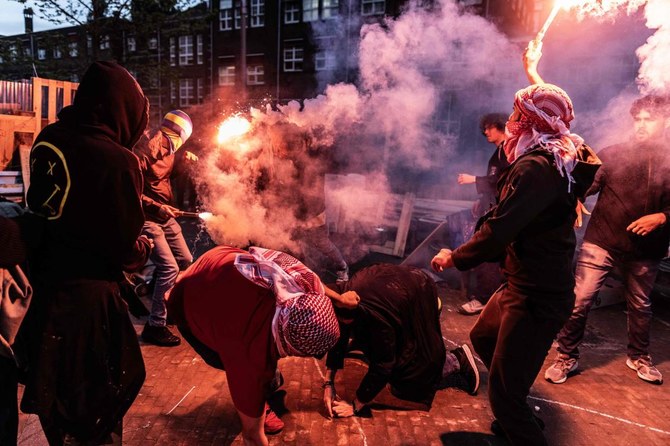
- Police said they had to act to stop the event and dismantle tents that been set up by protesters
- Outgoing Education minister Robbert Dijkgraaf said universities are a place for dialogue and debate and he was sad to see police had to intervene
AMSTERDAM: Dutch riot police ended a pro-Palestinian demonstration at an Amsterdam university early on Tuesday, arresting some 125 people in sometimes violent clashes, authorities said.
In messages posted overnight on social media X, police said they had to act to stop the event and dismantle tents that been set up by protesters, who used violence against police at the site.
“The police’s input was necessary to restore order. We see the footage on social media. We understand that those images may appear as intense,” police said.
Local media showed demonstrators shooting fireworks at police officers but there were no immediate reports of injuries on either side.
“All is now quiet ... police stay in the vicinity of the Roeterseiland campus,” police said later on X.
Outgoing Education minister Robbert Dijkgraaf said universities are a place for dialogue and debate and he was sad to see that police had to intervene.
Student protests over the war and academic ties with Israel have begun to spread across Europe but have remained much smaller in scale than those seen in the United States.
Last Friday, police in Paris entered France’s prestigious Sciences Po university and removed student activists who had occupied its buildings.
More than 100 students occupy the Ghent university, in Belgium, in both a climate and a Gaza protest that they want to prolong until Wednesday.
India election: Inside Modi and BJP’s plan to win a supermajority
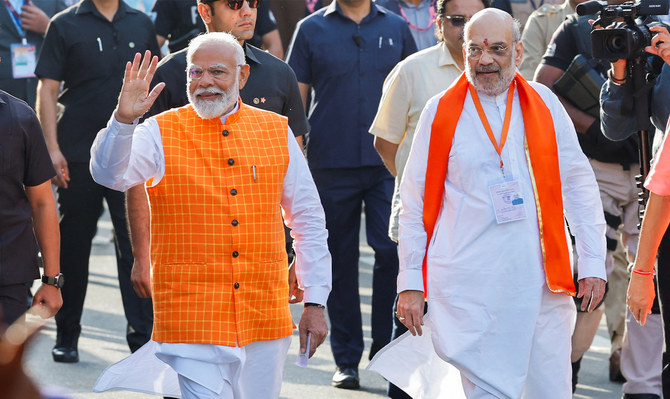
- Hindu nationalist BJP party and its allies are targeting 400 of 543 seats in India’s lower house of parliament
- Only once has a party crossed 400 mark, when Congress won following assassination of Indira Gandhi in 1984
BARPETA/THIRUVANANTHAPURAM, India: As India votes in a six-week general election, Narendra Modi’s image adorns everything from packs of rice handed out to the poor to large posters in cities and towns.
His Bharatiya Janata Party (BJP) is relying on the prime minister’s popularity as it seeks a super-majority in India’s parliament. Its message: Modi has delivered economic growth, infrastructure upgrades and India’s improved standing in the world.
But as the Hindu nationalist party and its allies target 400 of the 543 seats in India’s lower house of parliament — up from 352 won in 2019 — they are also employing local tactics in some vital constituencies they hope to wrest from the opposition.
Opinion polls indicate Modi will win a rare third term when voting ends on June 1. But only once in Indian history has a party crossed the 400 mark — when the center-left Congress party romped to victory following the assassination of its leader Indira Gandhi in 1984.
To examine how the right-wing National Democratic Alliance (NDA) aims to achieve that feat — and the obstacles it faces — Reuters spoke to nine NDA officials, three opposition leaders and two political analysts, as well as voters in six opposition-held seats the alliance is targeting.
They identified three of the BJP’s key tactics: enlisting celebrity candidates to unseat veteran opposition lawmakers; making an assault on the opposition’s southern strongholds by appealing to minorities such as Christians; and exploiting redrawn political boundaries that bolster the Hindu electorate in some opposition-controlled areas in the north.
“A combination of strategies, organizational commitment and tactical flexibility will help make inroads in seats never held by the party ever before,” BJP President J. P. Nadda, who oversees the party’s election strategy, told Reuters in April.
Some critics have warned the BJP would use a large majority to push through a more radical agenda in a third term. While the BJP’s manifesto focuses heavily on economic growth, it has also pledged to scrap separate legal codes for religious and tribal groups in areas such as marriage and inheritance.
Many Muslims and tribal groups oppose the plan, which would require a constitutional amendment to be passed by at least two-thirds of parliament.
“Modi wants a landslide majority only to be able to end the debate and deliberation on any policy matter in the parliament,” Congress party president Mallikarjun Kharge told Reuters.
Following low turnout in early voting, some BJP campaign officials have in recent days appeared less confident of securing a huge majority, though the party still expects to form the next government.
SOUTHERN STRATEGY
Modi’s party has criticized the dynastic politics that it says afflicts Congress, long dominated by the Nehru-Gandhi family. But in Pathanamthitta, a seat in the southern state of Kerala, it is fielding a political scion in Anil Antony — son of a veteran Congress leader.
The constituency, home to a sizeable Christian minority, has been held by Congress since its creation in 2009.
Anil’s father, former defense minister A.K. Antony, supports the incumbent and has denounced his son, a fellow Christian, for representing the Hindu nationalist party.
But Anil has another supporter: Modi, who came to Pathanamthitta in March and praised the BJP candidate for his “fresh vision and leadership.” The prime minister has visited the five states of southern India at least 16 times since December.
Nadda, the BJP president, acknowledged that winning a supermajority would require performing well in the five southern states, which are home to about 20 percent of India’s population but have not traditionally voted for his party.
In 2019, the NDA won just 31 of 130 seats across Andhra Pradesh, Karnataka, Kerala, Tamil Nadu and Telangana, all of which are linguistically diverse and have many Muslim and Christian voters.
Jiji Joseph, general secretary of the BJP’s minority wing in Kerala, said the party has made a concerted push for the 18 percent of voters there who are Christians. The BJP did not win a single seat in Kerala at the last general election.
“The BJP launched active contact with the Church and we started interacting with clergies directly,” he said, adding that the party now has 11,000 active Christian members. “There is a change. Christians now want to believe that BJP stands for them.”
In April, Anil became the first BJP candidate in Kerala to be endorsed by Christian leaders. He told Reuters his selection indicated the party offered opportunities to members from minority groups. He declined to comment on relations with his father.
Jayant Joseph, a Keralan Christian voter, said he backed the BJP because he had read media reports about Muslim men marrying Christian women and converting them to Islam. Most moderate Hindus consider allegations of large-scale forced conversions to be a conspiracy theory.
“Kerala is a secular state,” he said. “But for it to continue to be a secular state, the Muslim population and their conversion strategy must be kept under check.”
A Modi political aide, who spoke on condition of anonymity because he was not authorized to talk to media, said the NDA expects to win about 50 seats in the south.
K. Anil Kumar, a senior leader of Kerala’s ruling Communist Party of India (Marxist), said he did not believe BJP would do well in his state, which he said has a strong tradition of secularism.
“The BJP might try to side with the Christians on some issues but they are fundamentally a party of the Hindus and for the Hindus,” he said.
STAR CANDIDATES
In the Mandi constituency of the northern state of Himachal Pradesh, the BJP has recruited Bollywood actress Kangana Ranaut to break the Congress party’s grip on power. Congress is fielding as its candidate Vikramaditya Singh, whose mother currently represents the constituency. His father was the state’s long-time chief minister.
Ranaut, a political novice who calls herself a “glorious right-wing” personality, has starred in popular movies with nationalistic themes. She is known for her criticism of Bollywood executives who she said favored the relatives of famous actors for opportunities.
The actress is one of five actors running for the BJP this year, up from four in 2019.
No opinion polling on the Mandi race is publicly available.
Anjana Negia, an elementary school teacher who plans to vote for Ranaut, acknowledged that her preferred candidate had no political experience. But she said that she valued a new face and that a Modi-backed candidate would help “bring a fresh wave of development.”
Fielding celebrities and seeking the endorsement of entertainment personalities is relatively new for the BJP, which “long resisted such tactics because of its cadre-based nature” that prized grassroots efforts, said Milan Vaishnav, an expert on South Asian politics at the Carnegie Endowment for International Peace think-tank.
Ranaut declined an interview request. Federal BJP spokesman Shahzad Poonawala said she “has been successful in exposing dynastic culture and nepotism in Bollywood and now she is doing the same in politics.”
Singh, a state minister responsible for urban development, told Reuters that his family’s experiences gave him a better understanding of politics. Charges of nepotism were “shallow,” he said.
REDISTRICTING BENEFITS
The NDA is hoping for gains in the northeastern state of Assam, where it won nine of 14 seats in 2019. Assam’s BJP chief minister, Himanta Biswa Sarma, said in March he was confident of winning 13 seats.
The NDA’s confidence is rooted in a 2023 redistricting exercise in the state. India’s non-partisan Election Commission routinely redraws seat boundaries to reflect population changes; it is tasked with ensuring that no political party gains undue advantage from the changes.
But exercises since the last federal election in Assam and far-northern Jammu and Kashmir, India’s only majority Muslim region, diluted the Muslim vote in seats that the NDA is targeting, according to three BJP and four opposition officials.
The Election Commission declined to comment on the two exercises, citing the ongoing election.
In Assam, the NDA has high hopes for Congress-held Barpeta, which alliance candidate Phani Bhushan Choudhury said newly includes dozens of villages and some towns with large Hindu populations.
“Earlier (Barpeta) had a Muslim majority but now it is a Hindu majority,” said Choudhury. “That change has worked in my favor.”
He estimates that there are now 1.2 million Hindu voters in Barpeta, where he is campaigning on development and protecting the rights of what the NDA calls “indigenous Assamese” voters, who are mostly Hindu.
Choudhury’s Congress opponent Deep Bayan said the percentage of Hindus in Barpeta went from 30 percent to 70 percent. “Instead focusing on real issues affecting the people...(the BJP does) the politics of polarization,” he said.
Three of Jammu and Kashmir’s five seats are majority Muslim and held by the opposition. But the NDA hopes to swing one of them, Anantnag-Rajouri, after its voter rolls swelled by more than 50 percent to over 2 million, according to government data.
Many of the new voters are Hindus or from regional tribes — which benefited from new BJP policies awarding them education and employment privileges — according to regional BJP chief Ravinder Raina.
Raina said the BJP would support an NDA partner that it believed could win Anantnag-Rajouri and focus on retaining the two Hindu-majority seats it holds.
The two redistricting exercises presages a broader remapping of constituencies due after the election.
Vaishnav, of the Carnegie Endowment, said the remapping would distribute seats to the BJP-dominated north, which has much higher population growth rates, to the detriment of wealthier south India.
Indian PM Modi says he does not oppose Islam, Muslims as election campaign heats up
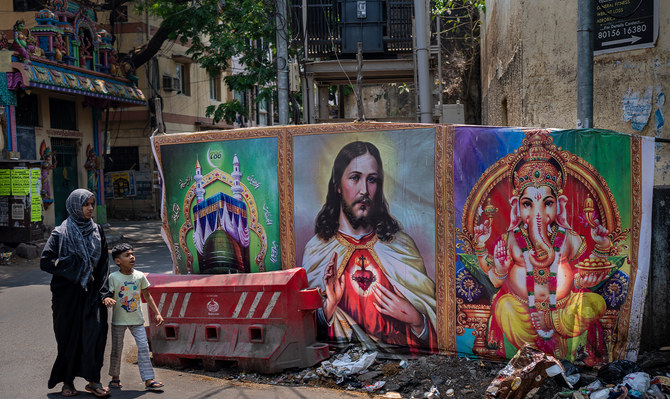
- Modi’s critics accuse him and his party of targeting India’s minority Muslims for electoral gains
- Allegations grew after Modi referred to Muslims recently as “infiltrators” who have “more children”
NEW DELHI: Indian Prime Minister Narendra Modi has said he does not oppose Islam or Muslims and wants the community to think about their future growth as they vote in an ongoing general election that completes its third phase on Tuesday.
Modi’s critics accuse him and his party of targeting minority Muslims for electoral gains and the allegations grew after Modi referred to Muslims in a recent speech as “infiltrators” who have “more children.”
He denied discriminating against Muslims and has linked his recent comment to what he described as the opposition Congress party’s election plan to redistribute the wealth of majority Hindus among Muslims. The Congress denies making any such promise.
“We are not opposed to Islam and Muslims,” Modi told broadcaster Times Now in an interview aired on Monday. “The opposition is looking after its own benefit. Muslim community is intelligent... the opposition is worried that their lies have been caught.”
Modi is seeking a rare third straight term in the seven-phase election that started on April 19 and ends on June 1. Eleven states and territories will vote in the third phase on Tuesday and surveys suggest Modi will win comfortably when results are declared on June 4.
His campaign began by showcasing economic achievements of the past 10 years but changed tack after the first phase of voting and focused more on firing up his Bharatiya Janata Party’s Hindu base by attacking rivals as pro-Muslim.
“I want to say to the Muslim community: introspect, think. The country’s progressing, if you feel any shortcomings in your community, what is the reason behind it? Why didn’t you get government benefits in the time when Congress was in power?“
Analysts say Modi and his Hindu nationalist party have made controversial remarks to invigorate their hard-line base as the election sees comparatively low voter turnout from previous years. Surveys say jobs and inflation are the main concerns of voters.
“Think of your children and your own future,” Modi said, referring to Muslims and the elections. “I don’t want any community to live like laborers because someone is scaring them.”





